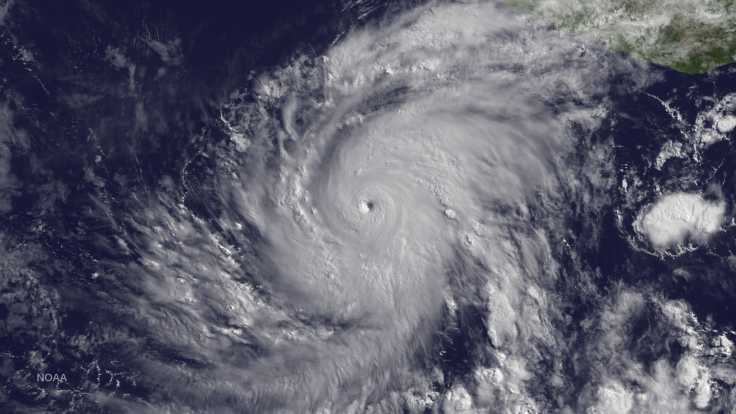
Hurricane Blanca is gaining steam, the The National Oceanic and Atmospheric Administration (NOAA) warned on Wednesday. With winds of 130 miles per hour and rising, the hurricane is tumbling up the Pacific Coast and could threaten Baja California by the weekend. Only yesterday, Blanca was relatively benign, with wind speeds of only 75 miles per hour. Though hurricanes are rare in the Pacific, they’re increasingly common. Blanca is the second to form this year (the first was Andres, which never threatened to make landfall). Last year, Hurricane Odile hit the baja region, stranding tourists in vacation havens like Los Cabos. Despite the growing threats from the Pacific, it’s the Atlantic hurricane season that’s most destructive.
Most hurricanes in the western hemisphere form at the warmest part of the Atlantic Ocean, near the equator and halfway between the eastern shoulder of Latin American and the western face of Africa. Some of the hurricanes originating in this zone find their way west to Central America, while others veer northwest and hit the U.S., or due north, where they tend to fizzle out in the chilly northern Atlantic. However, many of the hurricanes that hit Mexico originate in the Caribbean Ocean, and wipe across the Yucatan peninsula and Veracruz. Atlantic and Caribbean hurricanes routinely ravage top tourist destinations, usually in the early fall months. Pacific hurricanes, rare but unexpected, have caught citizens by surprise, resulting in many casualties.
3 Dealiest Mexico Hurricanes
Mexico (Oct. 1959): While Pacific hurricanes aren’t as common as Atlantic ones, this rare category 5 hurricane -- called "Hurricane Mexico -- decimated vast areas of western Mexico. It also created dangerous and unpredictable conditions that resulted in between 1,000 and as many as 2,000 deaths. Hundreds dies not from the wind and debris from the hurricane, but a single mudslide that buried 800 people. Many more reportedly died from poisonous snakes and scorpions that were displaced by landslides and flooding.
Ishmael (Sept. 1995): Though not the most deadly or most costly, hurricane Ishmael was probably the most terrifying storm ever for the fisherman aboard the 52 boats that it sank. Mariners misjudged the storm, which was expected to move slowly up the Pacific. Instead, it made a beeline for Sinaloa. As many as 57 fisherman died. Another fifty were killed when the hurricane made landfall
Pauline (Oct. 1977): destroying both lives and livelihoods, hurricane Pauline killed between 250 and 400 people, and caused 7.5 billion dollars in property damage. Twenty thousand were left homeless in and around the resort cities of Acapulco and Puerto Angel. Waves up to 30 feet high crashed against the coast and flash floods burst the banks of rivers across the region.
3 Costly Mexico Hurricanes
Wilma (Oct. 2005): Causing around 9 billion dollars in damage, Wilma was one of the most destructive hurricanes to ever hit Mexico. Wind and rain destroyed not just homes, but hotels, farm fields and some of the most lucrative strips of the Yucatan Peninsula. Residents along the storm’s path lost electricity for weeks and rampant looting hit businesses. Nineteen people also died as a result of Wilma.
Gilbert (Sept. 1988): With winds of 185 miles per hour, it’s ranked one of the most energetic storms ever to cross the atlantic. By the time Gilbert dissipated, it had leveled towns on the coast of Nuevo León and flooded the Río Santa Catarina, a river that runs right through the Monterrey. The hurricane killed 202 people and caused 2 billion dollars in damage.
Carlotta (June 2012): The first hurricane to ever make landfall in Oaxaca -- hundreds of miles southeast of Baja California, Carlotta is also one of the few early summer/late spring storms to commonly be considered one of Mexico’s top ten worst hurricanes. Most of the stronger storms tend to form in late August or into the fall. Yet in the Pacific, these june bugs can cause havoc. Carlotta-induced mudslides killed seven people and leveled 29,000 homes; a total of $113 million in damages.
© 2024 Latin Times. All rights reserved. Do not reproduce without permission.



